Cover Sheet Student and Trainer
Added on 2022-08-11
90 Pages20378 Words35 Views
Unit Assessment Pack (UAP) –
Cover Sheet
Student and Trainer/Assessor Details
Student ID
Student name
Course and Unit Details
Course code SIT30816
Course name Certificate III in Commercial Cookery
Unit code SITHCCC006
Unit name Prepare appetisers and salads
Student Declaration
• I certify that the work submitted for this assessment pack is my own. I
have clearly referenced sources used in my submission. I understand that
a false declaration is a form of malpractice;
• I have kept a copy of this assessment pack and all relevant notes,
attachments, and reference material that I used in the production of the
assessment pack;
• For the purposes of assessment, I give the trainer/assessor of this
assessment the permission to:
o Reproduce this assessment and provide a copy to another member
of staff; and
o Take steps to authenticate the assessment, including
communicating a copy of this assessment to a checking service
(which may retain a copy of the assessment on its database for
future plagiarism checking).
Student signature: ________________________________
Date: ____/_____/______________
RTO Connect Pty Ltd T/A Australian Study Link Institute
Version8.0
Page 1 of 90
Cover Sheet
Student and Trainer/Assessor Details
Student ID
Student name
Course and Unit Details
Course code SIT30816
Course name Certificate III in Commercial Cookery
Unit code SITHCCC006
Unit name Prepare appetisers and salads
Student Declaration
• I certify that the work submitted for this assessment pack is my own. I
have clearly referenced sources used in my submission. I understand that
a false declaration is a form of malpractice;
• I have kept a copy of this assessment pack and all relevant notes,
attachments, and reference material that I used in the production of the
assessment pack;
• For the purposes of assessment, I give the trainer/assessor of this
assessment the permission to:
o Reproduce this assessment and provide a copy to another member
of staff; and
o Take steps to authenticate the assessment, including
communicating a copy of this assessment to a checking service
(which may retain a copy of the assessment on its database for
future plagiarism checking).
Student signature: ________________________________
Date: ____/_____/______________
RTO Connect Pty Ltd T/A Australian Study Link Institute
Version8.0
Page 1 of 90
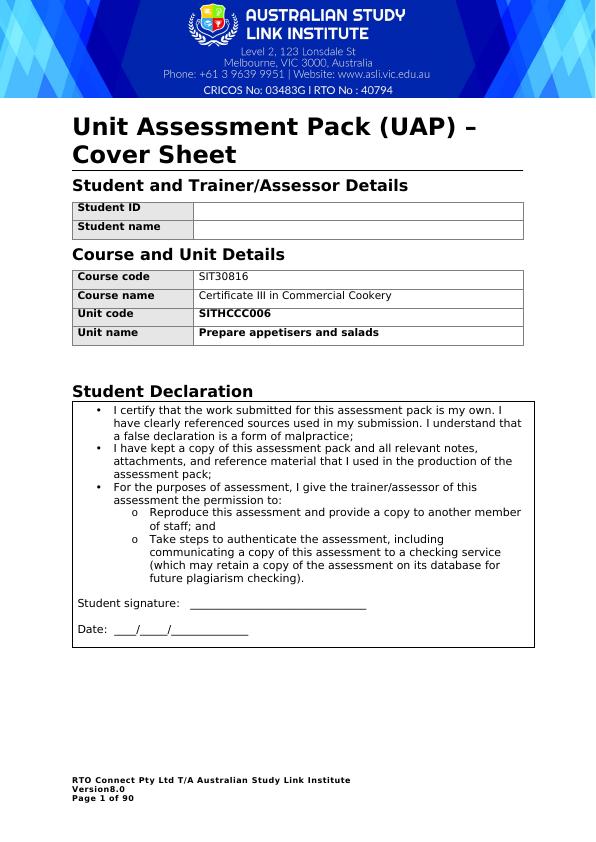
Assessment Plan
To demonstrate competence in this unit, you must be assessed as satisfactory in
each of the following assessment tasks.
Evidence recorded Evidence Type/ Method of
assessment
Sufficient
evidence
recorded/Outcom
e
Unit Assessment
Task 1
Unit Knowledge Test (UKT) S / NS (First
Attempt)
S / NS (Second
Attempt)
Unit Assessment
Task 2
Unit Skills Test (UST) S / NS (First
Attempt)
S / NS (Second
Attempt)
Final result C/
NYC
Date assessed
Trainer/Assessor
Signature
RTO Connect Pty Ltd T/A Australian Study Link Institute
Version8.0
Page 2 of 90
To demonstrate competence in this unit, you must be assessed as satisfactory in
each of the following assessment tasks.
Evidence recorded Evidence Type/ Method of
assessment
Sufficient
evidence
recorded/Outcom
e
Unit Assessment
Task 1
Unit Knowledge Test (UKT) S / NS (First
Attempt)
S / NS (Second
Attempt)
Unit Assessment
Task 2
Unit Skills Test (UST) S / NS (First
Attempt)
S / NS (Second
Attempt)
Final result C/
NYC
Date assessed
Trainer/Assessor
Signature
RTO Connect Pty Ltd T/A Australian Study Link Institute
Version8.0
Page 2 of 90
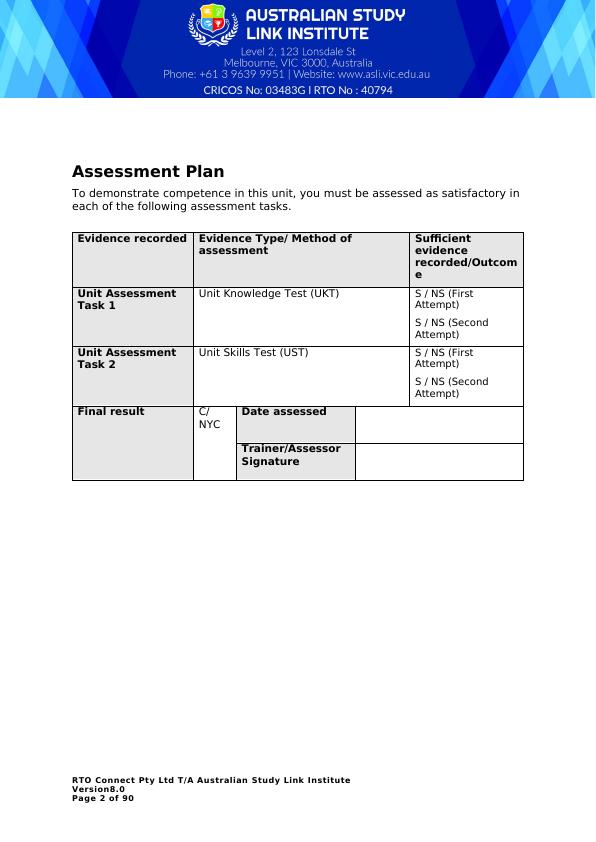
Assessment Conditions
Unit purpose/application
This unit describes the performance outcomes, skills and knowledge required to
prepare appetisers and salads following standard recipes. It requires the ability
to select and prepare ingredients, and to use relevant equipment and cookery
and food storage methods.
The unit applies to cooks working in hospitality and catering organisations. This
could include restaurants, educational institutions, health establishments,
defence forces, cafeterias, kiosks, cafes, residential caterers, in flight and other
transport caterers, and event and function caterers.
It applies to individuals who work with very little independence and under close
supervision and guidance of more senior chefs. They follow predefined
organisational procedures and report discrepancies to a higher-level staff
member for action.
No occupational licensing, certification or specific legislative requirements apply
to this unit at the time of publication.
What the student can expect to learn by studying this unit of competency
RTO Connect Pty Ltd T/A Australian Study Link Institute
Version8.0
Page 3 of 90
Unit purpose/application
This unit describes the performance outcomes, skills and knowledge required to
prepare appetisers and salads following standard recipes. It requires the ability
to select and prepare ingredients, and to use relevant equipment and cookery
and food storage methods.
The unit applies to cooks working in hospitality and catering organisations. This
could include restaurants, educational institutions, health establishments,
defence forces, cafeterias, kiosks, cafes, residential caterers, in flight and other
transport caterers, and event and function caterers.
It applies to individuals who work with very little independence and under close
supervision and guidance of more senior chefs. They follow predefined
organisational procedures and report discrepancies to a higher-level staff
member for action.
No occupational licensing, certification or specific legislative requirements apply
to this unit at the time of publication.
What the student can expect to learn by studying this unit of competency
RTO Connect Pty Ltd T/A Australian Study Link Institute
Version8.0
Page 3 of 90
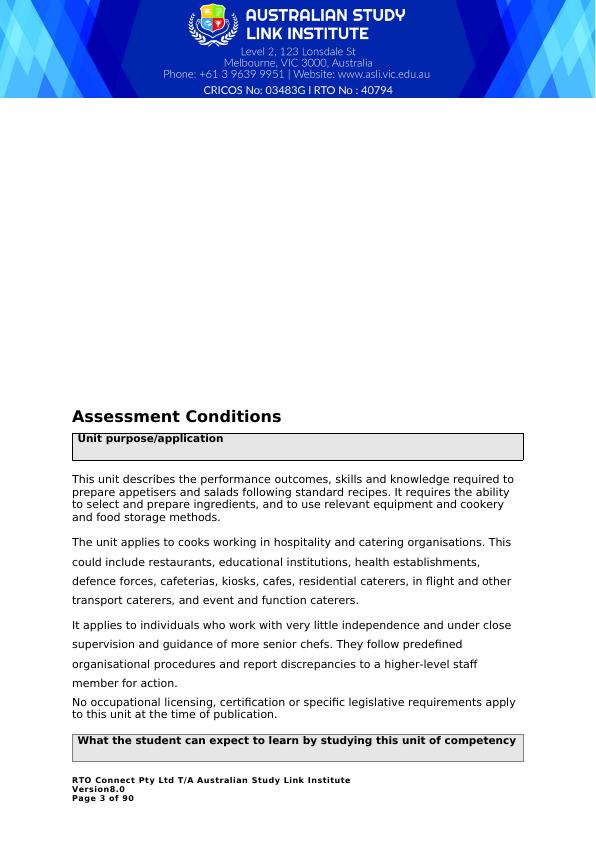
• Select ingredients
• Select, prepare and use equipment.
• Portion and prepare ingredients.
• Prepare appetisers and salads.
• Present and store appetisers and salads.
Training and assessment resources required for this unit of competency
The student will have access to the following:
Learner guide
PowerPoint presentation
Unit Assessment Pack (UAP)
Access to other learning materials such as textbooks
The resources required for these assessment tasks also include:
Business related environment area, this can be a:
o Real industry workplace
o Simulated industry environment
Codes of practice and standards issued by government regulators or
industry groups
Submission instructions
Your trainer/assessor will confirm assessment submission details for each
assessment task.
Academic integrity, plagiarism and collusion
Academic Integrity
Academic Integrity is about the honest presentation of your academic work. It means
acknowledging the work of others while developing your own insights, knowledge
and ideas.
As a student, you are required to:
• Undertake studies and research responsibly and with honesty and
integrity
• Ensure that academic work is in no way falsified
• Seek permission to use the work of others, where required
• Acknowledge the work of others appropriately
• Take reasonable steps to ensure other students cannot copy or misuse
your work.
Plagiarism
Plagiarism means to take and use another person's ideas and or manner of
expressing them and to pass them off as your own by failing to give appropriate
RTO Connect Pty Ltd T/A Australian Study Link Institute
Version8.0
Page 4 of 90
• Select, prepare and use equipment.
• Portion and prepare ingredients.
• Prepare appetisers and salads.
• Present and store appetisers and salads.
Training and assessment resources required for this unit of competency
The student will have access to the following:
Learner guide
PowerPoint presentation
Unit Assessment Pack (UAP)
Access to other learning materials such as textbooks
The resources required for these assessment tasks also include:
Business related environment area, this can be a:
o Real industry workplace
o Simulated industry environment
Codes of practice and standards issued by government regulators or
industry groups
Submission instructions
Your trainer/assessor will confirm assessment submission details for each
assessment task.
Academic integrity, plagiarism and collusion
Academic Integrity
Academic Integrity is about the honest presentation of your academic work. It means
acknowledging the work of others while developing your own insights, knowledge
and ideas.
As a student, you are required to:
• Undertake studies and research responsibly and with honesty and
integrity
• Ensure that academic work is in no way falsified
• Seek permission to use the work of others, where required
• Acknowledge the work of others appropriately
• Take reasonable steps to ensure other students cannot copy or misuse
your work.
Plagiarism
Plagiarism means to take and use another person's ideas and or manner of
expressing them and to pass them off as your own by failing to give appropriate
RTO Connect Pty Ltd T/A Australian Study Link Institute
Version8.0
Page 4 of 90
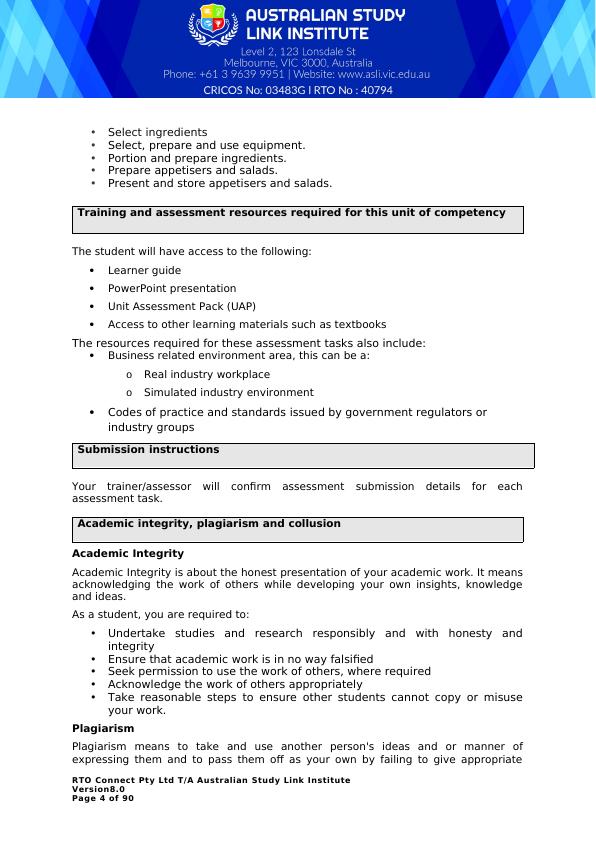
acknowledgement. This includes material sourced from the internet, RTO staff, other
students, and from published and unpublished work.
Plagiarism occurs when you fail to acknowledge that the ideas or work of others are
being used, which includes:
• Paraphrasing and presenting work or ideas without a reference
• Copying work either in whole or in part
• Presenting designs, codes or images as your own work
• Using phrases and passages verbatim without quotation marks or
referencing the author or web page
• Reproducing lecture notes without proper acknowledgement.
Collusion
Collusion means unauthorised collaboration on assessable work (written, oral or
practical) with other people. This occurs when a student presents group work as their
own or as the work of someone else.
Collusion may be with another RTO student or with individuals or students external
to the RTO. This applies to work assessed by any educational and training body in
Australia or overseas.
Collusion occurs when you work without the authorisation of the teaching staff to:
• Work with one or more people to prepare and produce work
• Allow others to copy your work or share your answer to an assessment
task
• Allow someone else to write or edit your work (without rto approval)
• Write or edit work for another student
• Offer to complete work or seek payment for completing academic work for
other students.
Both collusion and plagiarism can occur in group work. For examples of plagiarism,
collusion and academic misconduct in group work please refer to the RTO’s policy on
Academic integrity, plagiarism and collusion.
Plagiarism and collusion constitute cheating. Disciplinary action will be taken against
students who engage in plagiarism and collusion as outlined in RTO’s policy.
Proven involvement in plagiarism or collusion may be recorded on students’
academic file and could lead to disciplinary action.
Other Important unit specific Information
N/A
Unit outcome
• This unit is not graded and the student must complete and submit all
requirements for the assessment task for this cluster or unit of
competency to be deemed competent.
RTO Connect Pty Ltd T/A Australian Study Link Institute
Version8.0
Page 5 of 90
students, and from published and unpublished work.
Plagiarism occurs when you fail to acknowledge that the ideas or work of others are
being used, which includes:
• Paraphrasing and presenting work or ideas without a reference
• Copying work either in whole or in part
• Presenting designs, codes or images as your own work
• Using phrases and passages verbatim without quotation marks or
referencing the author or web page
• Reproducing lecture notes without proper acknowledgement.
Collusion
Collusion means unauthorised collaboration on assessable work (written, oral or
practical) with other people. This occurs when a student presents group work as their
own or as the work of someone else.
Collusion may be with another RTO student or with individuals or students external
to the RTO. This applies to work assessed by any educational and training body in
Australia or overseas.
Collusion occurs when you work without the authorisation of the teaching staff to:
• Work with one or more people to prepare and produce work
• Allow others to copy your work or share your answer to an assessment
task
• Allow someone else to write or edit your work (without rto approval)
• Write or edit work for another student
• Offer to complete work or seek payment for completing academic work for
other students.
Both collusion and plagiarism can occur in group work. For examples of plagiarism,
collusion and academic misconduct in group work please refer to the RTO’s policy on
Academic integrity, plagiarism and collusion.
Plagiarism and collusion constitute cheating. Disciplinary action will be taken against
students who engage in plagiarism and collusion as outlined in RTO’s policy.
Proven involvement in plagiarism or collusion may be recorded on students’
academic file and could lead to disciplinary action.
Other Important unit specific Information
N/A
Unit outcome
• This unit is not graded and the student must complete and submit all
requirements for the assessment task for this cluster or unit of
competency to be deemed competent.
RTO Connect Pty Ltd T/A Australian Study Link Institute
Version8.0
Page 5 of 90
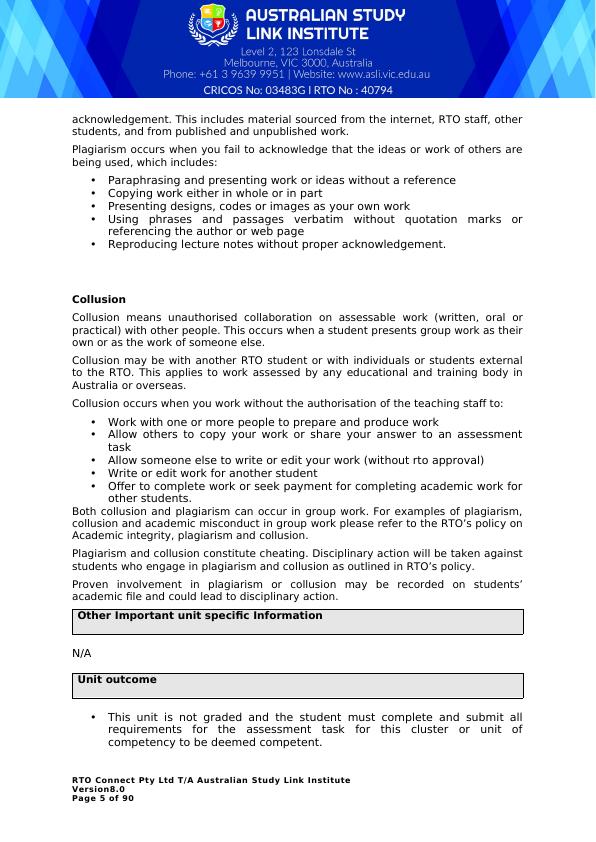
• Students will receive a 'satisfactorily completed' (S) or 'not yet
satisfactorily completed (NS) result for each individual unit assessment
task (UAT).
• Final unit result will be recorded as competency achieved/competent (C)
or competency not yet achieved/not yet competent (NYC).
Prerequisite/s
SITXFSA001 Use hygienic practices for food safety
Co-requisite/s
Nil
Foundation Skills
The Foundation Skills describe those required skills (learning, oral communication,
reading, writing, numeracy, digital technology and employment skills) that are
essential to performance. Foundation skills essential to performance are explicit in
the performance criteria of this unit of competency.
Relevant Legislation
Food Standards Australia New Zealand Act 1991
Food Standards Australia New Zealand Regulations 1994
Imported Food Control Act 1992
Food Act 1984
Food Act 2006
Food Regulation 2006
Food Production (Safety) Act 2000
Food Production (Safety) Regulation 2014
Food Act 2003
Food Regulation 2015
Australian Human Rights Commission Act 1986
Age Discrimination Act 2004
Disability Discrimination Act 1992
Racial Discrimination Act 1975
Sex Discrimination Act 1984
Code of ethics and codes of conduct
Ethical Principles in the Workplace
Codes of practice
The Privacy Act 1988 (Privacy Act) and Australian Privacy Principles (APPs)
Occupational Health and Safety Act 2004
Work Health and Safety Act 2011
Principles of assessment and rules of evidence
RTO Connect Pty Ltd T/A Australian Study Link Institute
Version8.0
Page 6 of 90
satisfactorily completed (NS) result for each individual unit assessment
task (UAT).
• Final unit result will be recorded as competency achieved/competent (C)
or competency not yet achieved/not yet competent (NYC).
Prerequisite/s
SITXFSA001 Use hygienic practices for food safety
Co-requisite/s
Nil
Foundation Skills
The Foundation Skills describe those required skills (learning, oral communication,
reading, writing, numeracy, digital technology and employment skills) that are
essential to performance. Foundation skills essential to performance are explicit in
the performance criteria of this unit of competency.
Relevant Legislation
Food Standards Australia New Zealand Act 1991
Food Standards Australia New Zealand Regulations 1994
Imported Food Control Act 1992
Food Act 1984
Food Act 2006
Food Regulation 2006
Food Production (Safety) Act 2000
Food Production (Safety) Regulation 2014
Food Act 2003
Food Regulation 2015
Australian Human Rights Commission Act 1986
Age Discrimination Act 2004
Disability Discrimination Act 1992
Racial Discrimination Act 1975
Sex Discrimination Act 1984
Code of ethics and codes of conduct
Ethical Principles in the Workplace
Codes of practice
The Privacy Act 1988 (Privacy Act) and Australian Privacy Principles (APPs)
Occupational Health and Safety Act 2004
Work Health and Safety Act 2011
Principles of assessment and rules of evidence
RTO Connect Pty Ltd T/A Australian Study Link Institute
Version8.0
Page 6 of 90
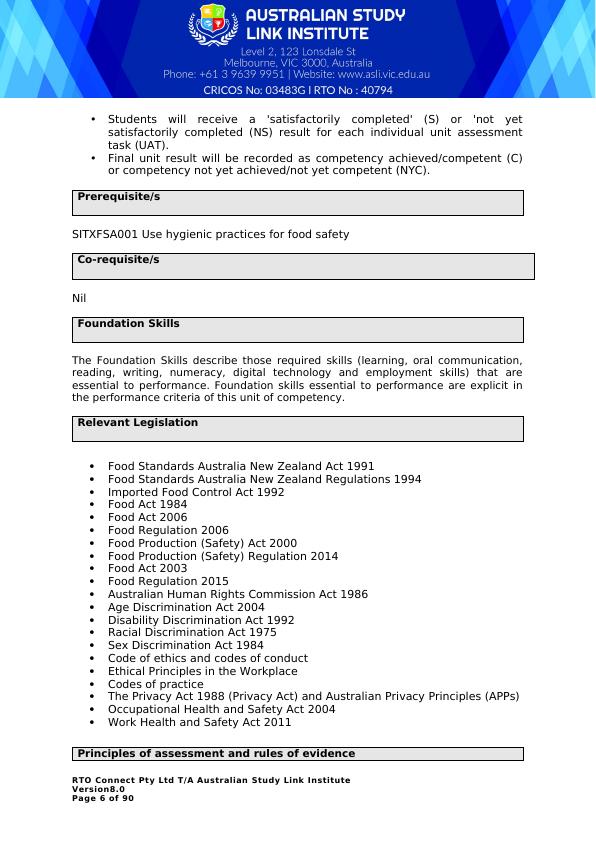
All assessment tasks will ensure that the principles of assessment and rules of
evidence are adhered to.
The principles of assessment are that assessment must be valid, fair, flexible,
reliable. The rules of evidence state that evidence must be sufficient, valid,
current and authentic.
AQF Level
AQF levels and the AQF levels criteria are an indication of the relative complexity
and/or depth of achievement and the autonomy required to demonstrate that
achievement.
All assessment tasks must ensure compliance with the requirements of AQF level
and the AQF level criteria. For more information, please visit
http://www.aqf.edu.au/
Further Information
For further information about this unit go to
https://training.gov.au/Training/Details/SITHCCC006
Additional Information
• This information will be managed by the provisions of the Privacy Act
and the Freedom of Information Act.)
• Students are required to satisfactorily complete and submit all
assessment tasks that contribute to the assessment for a unit.
• Students will be provided with one more attempt to complete this Unit
assessment pack (UAP) if trainer/assessor deems them not satisfactorily
completed (NS) in any Unit assessment task (UAT).
• Unit Pre-Assessment Checklist (UPAC) will be reviewed by the
trainer/assessor to ensure the student is ready for the assessment.
• Feedback regarding this Unit Assessment Pack (UAP) can be emailed to
the compliance and quality assurance department/administration
department in your RTO for continuously improving our assessment and
student resources.
Feedback to student
Feedback on students’ assessment performance is a vital element in their
learning. Its purpose is to justify to students how their competency was
assessed, as well as to identify and reward specific qualities in their work, to
recommend aspects needing improvement, and to guide students on what steps
to take.
Feedback defines for students what their trainer/assessor thinks is important for
a topic or a subject. At its best, feedback should:
RTO Connect Pty Ltd T/A Australian Study Link Institute
Version8.0
Page 7 of 90
evidence are adhered to.
The principles of assessment are that assessment must be valid, fair, flexible,
reliable. The rules of evidence state that evidence must be sufficient, valid,
current and authentic.
AQF Level
AQF levels and the AQF levels criteria are an indication of the relative complexity
and/or depth of achievement and the autonomy required to demonstrate that
achievement.
All assessment tasks must ensure compliance with the requirements of AQF level
and the AQF level criteria. For more information, please visit
http://www.aqf.edu.au/
Further Information
For further information about this unit go to
https://training.gov.au/Training/Details/SITHCCC006
Additional Information
• This information will be managed by the provisions of the Privacy Act
and the Freedom of Information Act.)
• Students are required to satisfactorily complete and submit all
assessment tasks that contribute to the assessment for a unit.
• Students will be provided with one more attempt to complete this Unit
assessment pack (UAP) if trainer/assessor deems them not satisfactorily
completed (NS) in any Unit assessment task (UAT).
• Unit Pre-Assessment Checklist (UPAC) will be reviewed by the
trainer/assessor to ensure the student is ready for the assessment.
• Feedback regarding this Unit Assessment Pack (UAP) can be emailed to
the compliance and quality assurance department/administration
department in your RTO for continuously improving our assessment and
student resources.
Feedback to student
Feedback on students’ assessment performance is a vital element in their
learning. Its purpose is to justify to students how their competency was
assessed, as well as to identify and reward specific qualities in their work, to
recommend aspects needing improvement, and to guide students on what steps
to take.
Feedback defines for students what their trainer/assessor thinks is important for
a topic or a subject. At its best, feedback should:
RTO Connect Pty Ltd T/A Australian Study Link Institute
Version8.0
Page 7 of 90
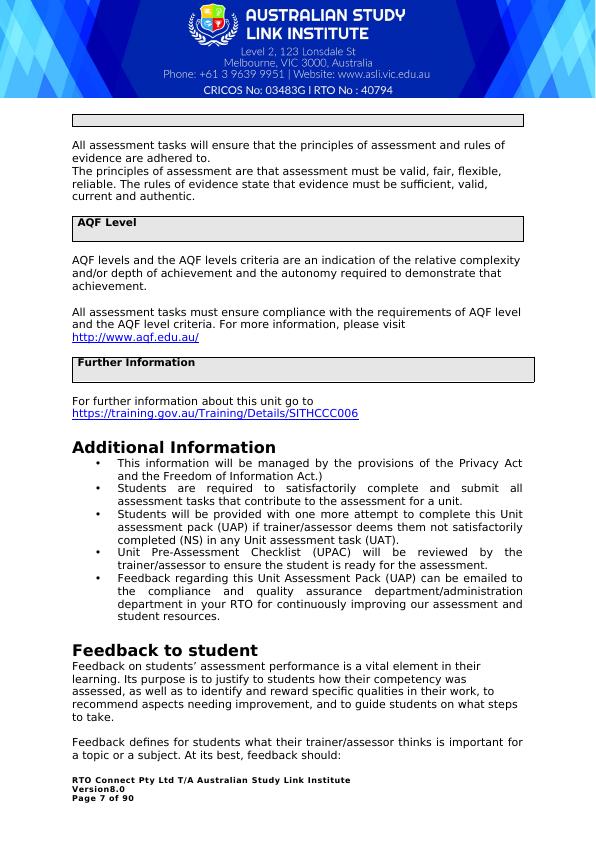
• Be provided for each Unit Assessment Task (UAT)
• Guide students to adapt and adjust their learning strategies
• Guide trainers/assessors to adapt and adjust teaching to accommodate
students’ learning needs
• Be a pivotal feature of learning and assessment design, not an add-on
ritual
• Focus on course and unit learning outcomes
• Guide students to become independent and self-reflective learners and
their own critics
• Acknowledge the developmental nature of learning.
If students have not received proper feedback, they must speak to compliance
and quality assurance department/administration department in the RTO/person
responsible for looking after the quality and compliance services of the RTO.
For more information, please refer to RTO Student Handbook.
Unit Pre-Assessment Checklist
(UPAC)
UAT 1 – Unit Knowledge Test
(UKT)
Purpose of the checklist
The pre-assessment checklist helps students determine if they are ready for
assessment. The trainer/assessor must review the checklist with the student
before the student attempts the assessment task. If any items of the checklist
are incomplete or not clear to the student, the trainer/assessor must provide
relevant information to the student to ensure they understand the requirements
of the assessment task. The student must ensure they are ready for the
assessment task before undertaking it.
Section 1: Information for Students
• Please make sure you have completed the necessary prior learning before
attempting this assessment.
• Please make sure your trainer/assessor clearly explained the assessment
process and tasks to be completed.
• Please make sure you understand what evidence is required to be
collected and how.
• Please make sure you know your rights and the Complaints and Appeal
process.
• Please make sure you discuss any special needs or reasonable
adjustments to be considered during the assessment (refer to the
Reasonable Adjustments Strategy Matrix and negotiate these with your
trainer/assessor).
RTO Connect Pty Ltd T/A Australian Study Link Institute
Version8.0
Page 8 of 90
• Guide students to adapt and adjust their learning strategies
• Guide trainers/assessors to adapt and adjust teaching to accommodate
students’ learning needs
• Be a pivotal feature of learning and assessment design, not an add-on
ritual
• Focus on course and unit learning outcomes
• Guide students to become independent and self-reflective learners and
their own critics
• Acknowledge the developmental nature of learning.
If students have not received proper feedback, they must speak to compliance
and quality assurance department/administration department in the RTO/person
responsible for looking after the quality and compliance services of the RTO.
For more information, please refer to RTO Student Handbook.
Unit Pre-Assessment Checklist
(UPAC)
UAT 1 – Unit Knowledge Test
(UKT)
Purpose of the checklist
The pre-assessment checklist helps students determine if they are ready for
assessment. The trainer/assessor must review the checklist with the student
before the student attempts the assessment task. If any items of the checklist
are incomplete or not clear to the student, the trainer/assessor must provide
relevant information to the student to ensure they understand the requirements
of the assessment task. The student must ensure they are ready for the
assessment task before undertaking it.
Section 1: Information for Students
• Please make sure you have completed the necessary prior learning before
attempting this assessment.
• Please make sure your trainer/assessor clearly explained the assessment
process and tasks to be completed.
• Please make sure you understand what evidence is required to be
collected and how.
• Please make sure you know your rights and the Complaints and Appeal
process.
• Please make sure you discuss any special needs or reasonable
adjustments to be considered during the assessment (refer to the
Reasonable Adjustments Strategy Matrix and negotiate these with your
trainer/assessor).
RTO Connect Pty Ltd T/A Australian Study Link Institute
Version8.0
Page 8 of 90
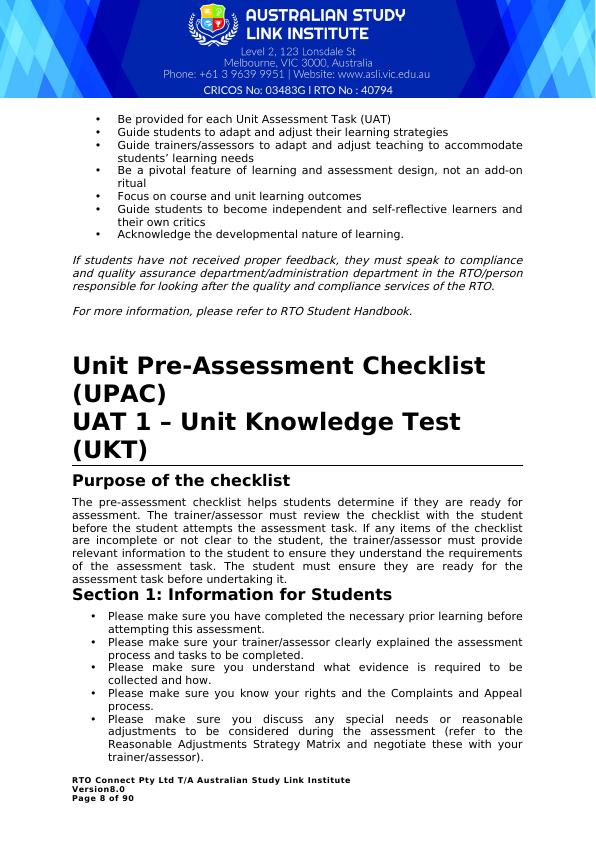
End of preview
Want to access all the pages? Upload your documents or become a member.
Related Documents
Prepare and Present Cakes, Pastries and Breads Assessment 2022lg...
|86
|18780
|58
Unit Assessment Pack (UAP) – Cover Sheetlg...
|69
|13870
|84
Vocational Education Training (VET) - Assignmentlg...
|58
|12976
|20
VOCATIONAL EDUCATION & TRAINING (VET).lg...
|53
|13789
|5
Establish and maintain a safe and healthy environment for children - Unit Assessment Pack (UAP)lg...
|60
|18975
|493
BSBWOR501 : Manage Personal Work Priorities and Professional Developmentlg...
|57
|18756
|92
